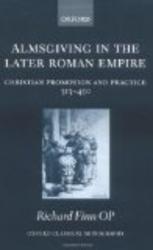Description
The article discusses how almsgiving in the later Roman Empire was used to promote the status of bishops, ascetics, and lay people. It reveals how the almsgiving crucial in constructing the bishop's standing was a co-operative task where honor was shared but which exposed the bishop to criticism and rivalry. Finn details how practices gained meaning from a discourse which recast traditional virtues of generosity and justice to render almsgiving a benefaction and source of honor, and how this pattern of thought and conduct interacted with classical patterns to generate controversy. He argues that co-operation and competition in Christian almsgiving, together with the continued existence of traditional euergetism, meant that, contrary to the views of recent scholars, Christian alms did not turn bishops into the supreme patrons of their cities.
Richard Finn OP examines the significance of almsgiving in Churches of the later empire for the identity and status of the bishops, ascetics, and lay people who undertook practices which differed in kind and context from the almsgiving practiced by pagans. It reveals how the almsgiving crucial in constructing the bishop's standing was a co-operative task where honor was shared but which exposed the bishop to criticism and rivalry. Finn details how practices gained meaning from a discourse which recast traditional virtues of generosity and justice to render almsgiving a benefaction and source of honor, and how this pattern of thought and conduct interacted with classical patterns to generate controversy. He argues that co-operation and competition in Christian almsgiving, together with the continued existence of traditional euergetism, meant that, contrary to the views of recent scholars, Christian alms did not turn bishops into the supreme patrons of their cities.
